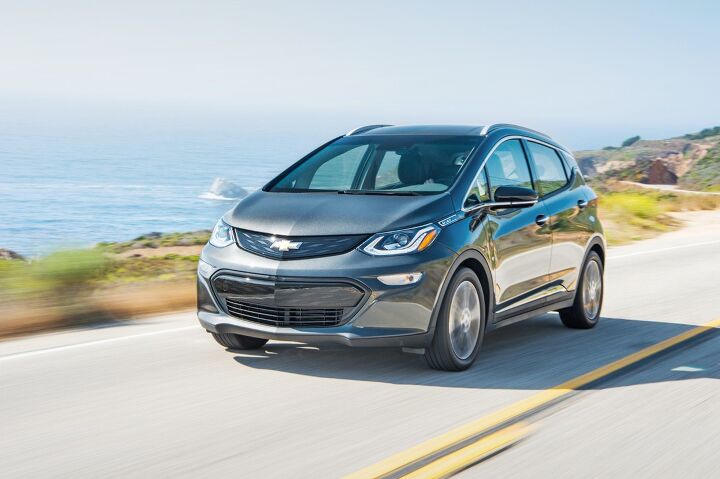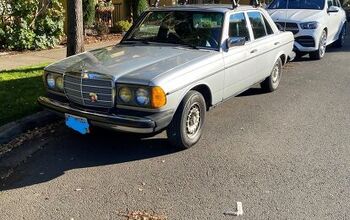Hot Tip: Chevrolet Addresses Bolt EV Fires, Readies Recall

Chevrolet has issued a statement to owners of Bolt EVs that could be subject to surprise fires while charging, offering more tips on how to avoid burning down their homes while it preps another recall. General Motors and supplier LG Chem have identified “two rare manufacturing defects” that they believe are causing the fires and are suggesting avoid charging their vehicles in an extremely specific manner until after the secondary recall has been conducted.
While the initial recall just involved a software update, which often feels more like a way for automakers to buy time than a real solution, the new one will actually replace some hardware. Chevrolet is still recommending customers take their vehicles in for diagnostics and the original software fix. But it also plans on replacing defective battery modules and recommending actions to minimize the fire risk posed by Chevy Bolts from the 2017-2019 model years.
Parking your vehicle outdoors and away from other flammable objects remains sound advice. We would also suggest not storing anything of value inside the car while charging and watching that thing like a paranoid hawk until after a mechanical fix has been completed. However, Chevrolet had some additional, highly specific ways of reducing the likelihood of being the person in your neighborhood whose EV exploded.
If you own a 2019 Chevrolet Bolt, GM is recommending using the Target Charge Level mode and not surpassing 90 percent of the vehicle’s maximum charging limitations. While that’s likewise true for the other impacted models, it manufacturer suggests using Hilltop Reserve mode. Both settings are designed to keep vehicles from overcharging when you don’t need to and ultimately extend the life of the battery. But I bet nobody anticipated using them for this.
But here’s the kicker. In addition to never charging the vehicle past 90 percent, Chevrolet would also like customers to ensure Bolt batteries aren’t depleted below 70 miles of remaining range and attempt to recharge the EV after every use. It sounds like GM wants to keep these cars from spending any more time plugged in than absolutely necessary. Some EV batteries, especially those furnished by LG Chem, have been suspected of coming undone while charging for a few years now and this ( along with the Hyundai Kona EV recall) has really pushed the matter in front of the public.
While pretty much every lithium-ion battery is capable of hazardous thermal runaway when overcharged or overheated, they’re supposed to possess fail-safe circuitry that shuts everything down when the voltage is out of whack. But these systems are useless if manufactured or designed incorrectly, occasionally resulting in extremely difficult to stop and sometimes explosive vehicle fires. We’re not exactly sure of what went wrong with the Bolt, though the circumstances seem highly similar to the uptick in charging-related fires we’ve seen over the last few years.
Fortunately, EVs aren’t supposed to catch fire with a frequency greater than internal combustion cars. But the brunt of the supportive data comes from outlets hoping to sell you an electric car, making some claims suspect. For example, Tesla has asserted that gasoline-powered cars are about 11 times more likely to catch fire than one of its models. There might be some truth to that, specifically when Tesla fires seem to be preceded by high-speed crashes that could turn any automobile to ashes. But we doubt other manufacturers are willing to make similar claims and there have been some studies that undermine the premise that EVs are less fire-prone.
In 2012, the National Highway Traffic Safety Administration (NHTSA) accidentally burned up a Chevrolet Volt during crash testing. It then ordered a trio of batteries to wail on, getting two of the three to catch fire. While this seemed damning, there’s not much to compare it against. The NHTSA typically preps gasoline-powered models without fuel during crash assessments and focuses on things like how flammable the interior materials are in smaller-scale tests. Frankly, we need more comprehensive research before anything can be proven. Electric and hybrid cars are still relatively new and there’s not been enough time spent examining the long-term implications of battery charging or how much abuse they can take before thermal runaway becomes an issue.
[Image: General Motors]

A staunch consumer advocate tracking industry trends and regulation. Before joining TTAC, Matt spent a decade working for marketing and research firms based in NYC. Clients included several of the world’s largest automakers, global tire brands, and aftermarket part suppliers. Dissatisfied with the corporate world and resentful of having to wear suits everyday, he pivoted to writing about cars. Since then, that man has become an ardent supporter of the right-to-repair movement, been interviewed on the auto industry by national radio broadcasts, driven more rental cars than anyone ever should, participated in amateur rallying events, and received the requisite minimum training as sanctioned by the SCCA. Handy with a wrench, Matt grew up surrounded by Detroit auto workers and managed to get a pizza delivery job before he was legally eligible. He later found himself driving box trucks through Manhattan, guaranteeing future sympathy for actual truckers. He continues to conduct research pertaining to the automotive sector as an independent contractor and has since moved back to his native Michigan, closer to where the cars are born. A contrarian, Matt claims to prefer understeer — stating that front and all-wheel drive vehicles cater best to his driving style.
More by Matt Posky
Latest Car Reviews
Read moreLatest Product Reviews
Read moreRecent Comments
- Redapple2 jeffbut they dont want to ... their pick up is 4th behind ford/ram, Toyota. GM has the Best engineers in the world. More truck profit than the other 3. Silverado + Sierra+ Tahoe + Yukon sales = 2x ford total @ $15,000 profit per. Tons o $ to invest in the BEST truck. No. They make crap. Garbage. Evil gm Vampire
- Rishabh Ive actually seen the one unit you mentioned, driving around in gurugram once. And thats why i got curious to know more about how many they sold. Seems like i saw the only one!
- Amy I owned this exact car from 16 until 19 (1990 to 1993) I miss this car immensely and am on the search to own it again, although it looks like my search may be in vane. It was affectionatly dubbed, " The Dragon Wagon," and hauled many a teenager around the city of Charlotte, NC. For me, it was dependable and trustworthy. I was able to do much of the maintenance myself until I was struck by lightning and a month later the battery exploded. My parents did have the entire electrical system redone and he was back to new. I hope to find one in the near future and make it my every day driver. I'm a dreamer.
- Jeff Overall I prefer the 59 GM cars to the 58s because of less chrome but I have a new appreciation of the 58 Cadillac Eldorados after reading this series. I use to not like the 58 Eldorados but I now don't mind them. Overall I prefer the 55-57s GMs over most of the 58-60s GMs. For the most part I like the 61 GMs. Chryslers I like the 57 and 58s. Fords I liked the 55 thru 57s but the 58s and 59s not as much with the exception of Mercury which I for the most part like all those. As the 60s progressed the tail fins started to go away and the amount of chrome was reduced. More understated.
- Theflyersfan Nissan could have the best auto lineup of any carmaker (they don't), but until they improve one major issue, the best cars out there won't matter. That is the dealership experience. Year after year in multiple customer service surveys from groups like JD Power and CR, Nissan frequency scrapes the bottom. Personally, I really like the never seen new Z, but after having several truly awful Nissan dealer experiences, my shadow will never darken a Nissan showroom. I'm painting with broad strokes here, but maybe it is so ingrained in their culture to try to take advantage of people who might not be savvy enough in the buying experience that they by default treat everyone like idiots and saps. All of this has to be frustrating to Nissan HQ as they are improving their lineup but their dealers drag them down.


































Comments
Join the conversation
@MattPosky: Great article!
This is yet another reason not to buy the Bolt. Then again not many people are buying them anyway.